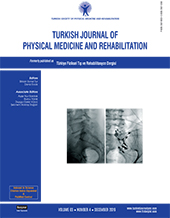Effect of virtual reality therapy on functional development in children with cerebral palsy: A single-blind, prospective, randomized-controlled study
2 Department of Physical Medicine and Rehabilitation, University of Health Sciences, Ankara Physical Medicine and Rehabilitation Training and Research Hospital, Ankara, Turkey DOI : 10.5606/tftrd.2019.2388 Objectives: The aim of this study was to investigate the effect of virtual reality (VR) therapy on motor and functional development in children with cerebral palsy (CP).
Patients and methods: In this single-blind, prospective, randomized-controlled study, a total of 41 patients (28 males, 13 females; mean age 8.49 years; range, 5 to 15 years) receiving inpatient treatment for CP were included between April 2009 and September 2009. The patients were randomly divided into two groups as the study group (n=21) and control group (n=20). Neurophysiological and conventional treatment methods, and occupational therapy were applied to all patients. In addition, a total of 12 VR therapy sessions for one hour were administered three days a week for four weeks to the study group. Before and after treatment, the Bimanual Fine Motor Function (BFMF) test was performed to measure hand functioning, Gross Motor Function Classification System (GMFCS) for functional levels, and Functional Mobility Scale (FMS) for mobility.
Results: There was a significant increase in the BFMF, GMFCS, and FMS scores after treatment, compared to baseline values in the study group (p<0.05). There was a statistically significant results in favor of the study group for all parameters after treatment compared to pre-treatment values (p<0.05).
Conclusion: Our study results indicate that VR therapy is a useful treatment method which can be used in rehabilitation of CP with improved motor function. The addition of this method to conventional rehabilitation techniques may have a significant impact on treatment success.
Keywords : Cerebral palsy, motor function, rehabilitation, virtual reality therapy

















